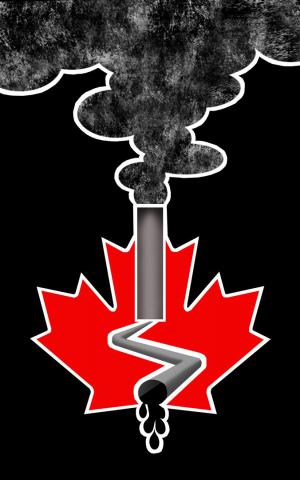Change the conversation, support rabble.ca today.
In recent years, a number of informed voices have begun to refer to Canada as a “petrostate.” Andrew Nikiforuk, whose work we recently profiled, has, for instance, used the term in his in-depth analysis of the political economy of oil in Canada. This week a new study from the Polaris Institute reveals shocking numbers from the halls of power that would seem to back up the case for describing Canada under the Harper government as a petrostate. Here is the media release summarizing the Polaris Institute’s study. You can read the full report here.
A new report entitled “Big Oil’s Oily Grasp — The making of Canada as a Petro-State and how oil money is corrupting Canadian politics” released Tuesday by the Ottawa-based Polaris Institute found that six main oil industry players, including Enbridge and TransCanada, met with federal cabinet ministers 53 times between September 2011 and September 2012, the period when the business-friendly Bill C-38 — which guts environmental legislation — was being designed.
During this same time period, only one meeting between a federal cabinet minister and an environmental organization took place (Greenpeace met with Joe Oliver in March, 2012).
In addition, the report shows how the two main fossil fuel industry associations have met with public office holders 367 per cent more times than the two major Canadian automotive industry associations and 78 per cent more times than both major mining industry associations since 2008.
“The amount of face time the oil industry gets in Ottawa in personal meetings and other correspondence greatly exceeds the time afforded other major industries in Canada,” says report co-author Daniel Cayley-Daoust. “No one doubts the hold the oil industry has on this current government, but it is important Canadians are aware that such a high rate of lobbying to federal ministers has strong policy implications.”
The report highlights significant jumps in lobbying activity by the oil industry between 2010 and 2011, in particular from the pipeline industry. In that same time period, the Canadian Energy Pipeline Association recorded 71 per cent more meetings with public office holders while TransCanada Corporation and Enbridge increased by 49 per cent and 44 per cent respectively. The Canadian Association of Petroleum Producers (CAPP) increased its lobbying activities by 121 per cent. These increases occurred during the same time as the industry sought approval for the Northern Gateway pipeline.
“Prime Minister Harper and his top ministers have spent hundreds of hours over the past few years listening to oil executives outline their policy wishes,” said Richard Girard, lead researcher of the Polaris Institute and co-author of the report. “We call for a full independent public inquiry to investigate the influence the oil industry is having on the Harper government through lobbying.”
He added there are major loopholes in the Government of Canada’s Lobbying Act that block the possibility of quantifying with certainty the amount of access the oil industry has on our elected officials and civil servants. In the United States, in contrast, there is much more transparency because lobbyists like oil companies must declare the amount of money spent on lobbying.
The lobbying data used in the report was compiled from the Registry of Lobbyists located on the website of Office of the Commissioner of Lobbying of Canada.




